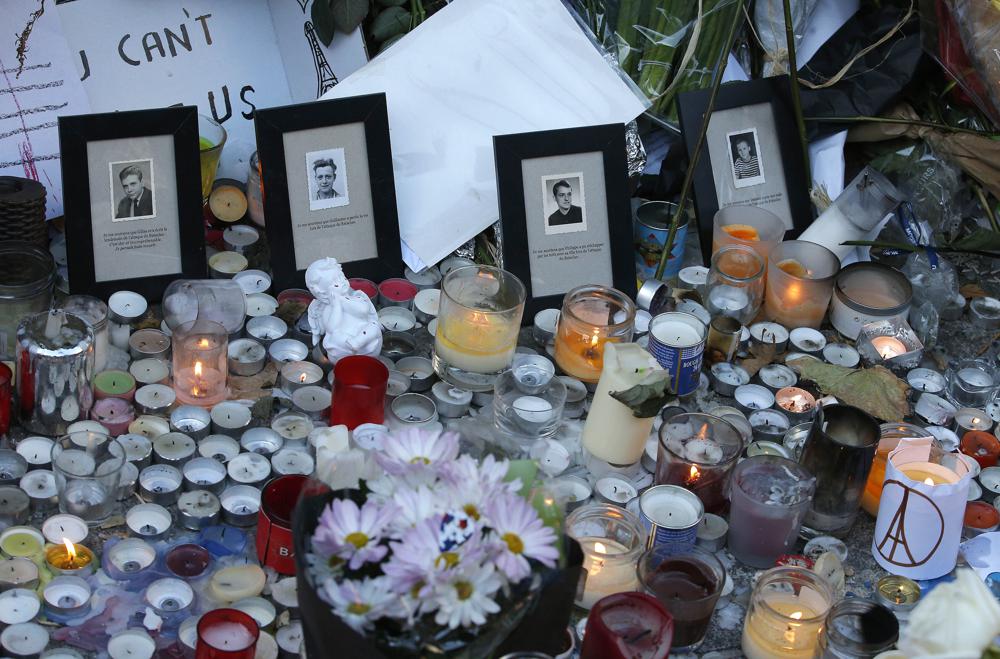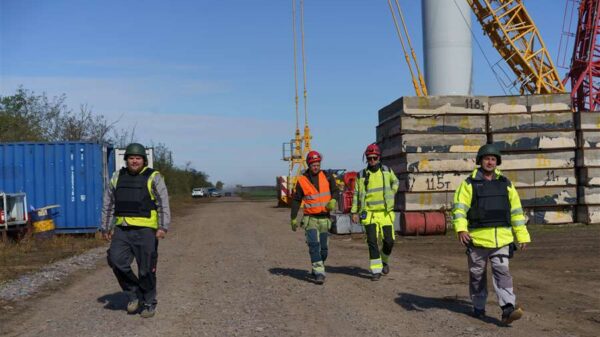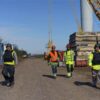FILE – In this Nov.15, 2015 file photo, pictures of victims are placed behind candles outside the Bataclan concert hall in Paris.For more than two weeks, dozens of survivors from the Bataclan concert hall in Paris have testified in a specially designed courtroom about the Islamic State’s attacks on Nov. 13, 2015 – the deadliest in modern France. The testimony marks the first time many survivors are describing – and learning – what exactly happened that night at the Bataclan, filling in the pieces of a puzzle that is taking shape as they speak. (AP Photo/Christophe Ena, File)
PARIS (AP) — They were animals, many of them say. Prey that had lost all sense of time. Targets who were no longer human to either their hunters or themselves.
For more than two weeks, dozens of survivors from the Bataclan concert hall in Paris have testified in a specially designed courtroom about the Islamic State group’s attacks on Nov. 13, 2015. They stand just a few steps away from 14 men accused in the bloodshed — the deadliest in modern France.
The testimony marks the first time many survivors are describing – and learning – what exactly happened that night at the Bataclan, filling in the pieces of a puzzle that is taking shape as they speak. For most, it is their first public reckoning with a night they describe, one after another, day after day, in haunting words that are startlingly similar.
In all, 130 people died that night at the Bataclan, at France’s national stadium and in neighborhood restaurants and bars. Hundreds more were injured in body and soul, 90 of them at the Bataclan, in the three-hour series of attacks.
Holding a laser pointer in trembling hands, witness after witness faces a courtroom screen with the Bataclan’s floorplan — a floorplan that the technical director handed to police the moment they arrived to locate the doors and windows. The shaking dot of light finds where they were when the attack started, and sometimes where they ended up.
Some of the survivors were in the concert hall for just a few minutes after the shooting started before fleeing outside into the streets. Others remained behind for hours, beneath dead bodies on the dance floor, nested in fiberglass in the ceiling, crammed into a janitor’s closet with only a broom to bar the door. Silent, praying that the three men bent on killing them wouldn’t find them.
All nine attackers died that night or in the days that followed. The lone survivor of the IS cell, who fled the city after his suicide vest malfunctioned, is among those on trial. The others are accused of helping with logistics or transport.
On the night of Nov. 13, 2015, the American rock group Eagles of Death Metal was playing to a full house in the storied concert hall in central Paris. It was unseasonably warm, and temperatures rose in the dance pit as the second set swung into action.
Clarisse, then 24, was in the coatroom with a friend, getting ready to run out to a nearby convenience store for beers in the time-honored subterfuge of the young and broke. When the shooting started at the entrance at 9:47 p.m., there was only one place to go: Back inside, into the dance pit.
But the gunmen followed close behind.
“And I’m ready,” Clarisse says. “I’m expecting to get shot in the back. And I think, will it hurt? Will I lose consciousness? Die immediately?”
Edith was at the bar near steps leading down toward the pit. She, like nearly every other survivor, told the judge she didn’t want her last name to be publicly released.

The laser dot swings wildly on the screen as her shaking hands point to a stairwell she took on an instinct she describes as “something animal, almost reptilian.” In the balcony, she dived beneath a folding chair. A giant of a man lay next to her, both of them breathing as quietly as their panicked bodies would allow.
At first the firing came in long bursts.
“Then one at a time it begins. A cry. A shot. A phone ringing. A shot. Someone pleading. A shot. There is no way out,” Edith tells the judges, her hands twisting as she pulls rings off her fingers and replaces them one by one.
Jérôme, at the concert with six friends, was just below, close to the sound console. They were trapped, lying on the ground during what he described as the “calm cleanup.”
He heard the shooter’s steady breaths behind him as he fired on one of Jérôme’s friends. And then a pause. They were out of bullets.
“As soon as they stopped to reload, there was no sound. It was like being in a cathedral, absolute silence,” Jérôme says. By then, the smell of blood and powder was rising, an odor engraved in the memory of all who made it out that night.
Thibault and his wife were near the stage, on the ground. He peeked behind him and saw one of the gunmen. “His face is uncovered and I understand that he’s not going to flee,” he says. “He’s going to end this with the police. And it’s at that moment that I understand that I’m going to die.”
His cold comfort: “At least I’m not going to leave an orphan.”
By now, about five minutes after the three gunmen burst into the Bataclan, the floor was wet with blood. The gunmen seemed to move away, and people surged toward the stage.
Clarisse was among dozens to take a back staircase up as far as they could go. They ended up in a dead-end room with a toilet in the corner. She stood on the toilet and smashed the ceiling, breaking through to a snarl of electric wires and fiberglass.
Thibault and his wife, Anne-Laure, joined the crowd but lost sight of each other running upstairs. The pipes broke and water started flooding the room. Still, person after person climbed on the toilet and then reached down from the crawlspace for someone below.
Anne-Laure did not. “I fled for a hiding space like an animal,” she testified. “I was so angry with myself about that afterward.”
Thibault eventually found her nested in the fiberglass and curled around her to wait. “It’s going to end this way, either the terrorists will find us or the police will, but I’ll be with my wife.”
Dozens of wounded and dead still lay in the pit. Among them were Pierre-Sylvain and his girlfriend, in the middle of the room. He felt a flash at the first burst of gunfire and knew he was hit, and so was she.
When the attackers went upstairs, he shook the people on the ground next to him. None moved. He lifted his bleeding girlfriend, who seemed to weigh nothing, and looked around.
The first thing he saw was the blinding light of the stage spots, turned in every direction. Then the horror struck.
“The entire pit was covered in bodies, and you couldn’t distinguish the living from the dead. I was in a concert hall but what I had in front of me was a mass grave.” He stepped over the bodies, on the bodies, to get out.
Pierre-Sylvain realized only then that he’d been shot through the face. The bullet exited beneath his eye. His girlfriend was hit in the head and then the projectile splintered. Both survived. Between them, they’ve undergone more than 20 operations.
“I didn’t understand why I stayed conscious. I was later told the body sends out endorphins to dull the pain and adrenaline to flee,” he tells the judge, his face expressionless.
Sandrine was just next to the stage and fell to the ground at the first mass exit. She was trampled, her lungs crushed, and blacked out.
When she regained consciousness, she pushed herself up, uncomprehending when the floor gave way. “It wasn’t the floor I was pushing on, but bodies, lifeless bodies.”
She hardly remembers her feet touching the ground as she left the building. She felt something hard in her boot and reached into the toe, hoping it was the necklace that had fallen off in the chaos. “But it’s not a necklace, it’s a bullet.”
Amandine, whose leg and arm were shattered, waited still longer, wishing for unconsciousness. She was on the floor when the first two officers arrived at 9:56 p.m., armed only with handguns.
One of them hit an attacker just before he executed a hostage on stage. His suicide vest detonated.
“Pieces of flesh fell on me were that were our tormentor’s, and feathers, I imagine, from his jacket.” The officers asked anyone who could walk to exit, but she couldn’t move. “And so there I stayed, with the gravely injured and the dead.”
Finally, after two hours, an officer dragged her out by her good arm. When she made it to the hospital “everyone looked at me for what I didn’t realize I was, which is a survivor.” Despite repeated surgeries, she still leans on a crutch around her forearm and grips the sides of the podium with her good hand.
Edith, hidden beneath a balcony seat, was evacuated around 11:30 p.m. Those in the balcony walked down single-file, past the pit and the bar, led by a police officer who told them, don’t look. It was impossible not to.
“The sheer volume of all these bodies that two hours ago were dancing,” she says, trying fruitlessly to stop the shaking of her hands. “It’s narrow and we try to step around them but we can’t always … All those who saw it, understand.”
Upstairs, the two remaining attackers rounded up 11 men and women into a narrow hallway. One gunman fired out a window into the alley below. “Got him,” he exulted.

They ordered a hostage to sit with his back to the door leading to the balcony and describe the victims outside moaning in pain. Another captive stood watch out the windows.
The gunmen started negotiations with police using one of the hostage’s phones. Suddenly, the doorway started to cave. A gunshot whistled between the heads of two hostages.
An enormous 90-kilogram (200-pound) black shield impervious to Kalashnikov bullets rolled through the entry, pushed by police, as big as the door itself. The shield teetered on the steps and fell on a female hostage. Two concussion grenades filled the room with gunpowder and dust.
One of the attackers emptied his clip, and the other blew himself up in the back staircase. The entire building shook. Both attackers were dead; and all 11 hostages were alive, stunned, but not one struck by a bullet. It was 12:18 a.m.
One by one, the former captives were led away through the pit downstairs. As they walked through the bodies, David wondered in anguish “did I collaborate? Did I participate?” The same thought flashed through the mind of Sébastien, who testifies in the same flannel shirt he wore that night.
“I changed my job, I changed my life. I changed my girlfriend, without wanting to obviously. My new companion is herself a survivor,” he says.
It took more than an hour for police to find the survivors hidden in closets, on the roof. Those in the ceiling were the last to come out.
The judge asks Clarisse if she realized she had saved many lives that night.
“So I’m told. But I truly don’t realize it. For me, it was out of the question to die without doing everything I could to get out.”
But, she discovered, getting out was just the beginning. She turns to the defendants.
“You stole from me the pleasure of carefree evenings, the pleasure of walking down the street without panicking, the pleasure of going to the movies, the pleasure of living at ease and without anguish.”
Thibault, who credits her with saving him, describes returning to his humanity as he exited the building. But, he adds, “The sense of guilt is extremely strong. Why did I survive when so many didn’t?”
He and his wife have been unable to have children. A small woman with a pixie haircut that frames her fragile cheekbones, she weeps as she says that night left her too fragile emotionally and physically. Then she apologizes because others have suffered more.
Edith also says her testimony feels almost illegitimate for leaving the Bataclan alive and physically unharmed. But that night left her a shell of the woman she once was. Among the many tattoos that enlace her limbs is one of the Bataclan, on her left forearm.
“We are still trapped in Nov. 13,” she says.
Pierre-Sylvain, whose face will be forever scarred, is hopeful that the trial will help.
“That this is happening in a sanctified space, it allows victims to speak,” he says. “It can ease the burden on each of us. … Many people saw this as an end. I see it as a beginning.”

Copyright 2021 Associated Press. All rights reserved.






























You must be logged in to post a comment Login